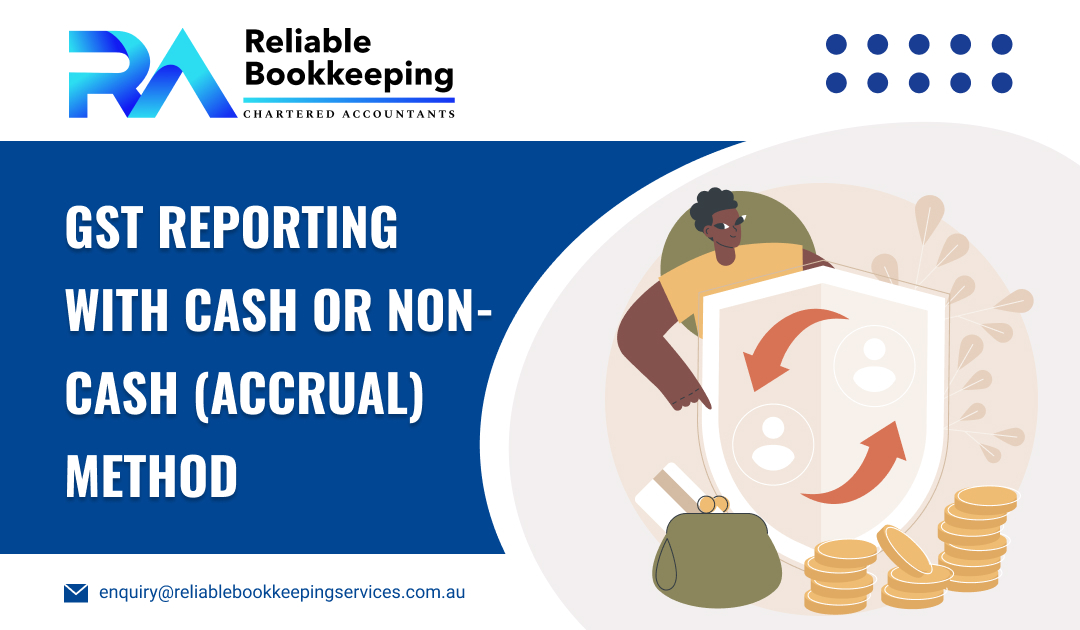Are you confused about choosing a method between cash and non-cash accrual for reporting GST? No worries, the blog will help you understand the difference between these two accounting methods for reporting GST. Mostly, large businesses choose the accrual method for GST purposes, but small businesses have a choice to choose any method.
Non-Cash (Accrual) Accounting Method
Expenses and income are recorded when you send or receive an invoice, not when the bill is paid. As a result, you will get a clear picture of your debt and credit and it will provide you insight into the financial position of your company. Debt monitoring is essential in today’s economic environment to avoid facing financial crises. The accrual method enables you to check the current financial trends to allow you to estimate future sales, expenses, and revenue. Bookkeepers in Melbourne use this method as it is beneficial if you have to deal with a large amount of money or a number of contracts. It tracks your true financial status by showing money you owe others and money owed to you.
• Invoice payments are rarely immediate which can result in delays when you record transactions. However, this issue can be prevented using the accrual method.
• With the accrual method, you can have a more accurate picture of your company’s finances which allows you to make a plan for future changes.
• The accrual method is useful in providing you with a more detailed view of your business to make it easy to get approved for long-term financing, which is sometimes important for many small businesses.
Using the accrual method means you account for GST on the BAS that covers the time period in which you either:
• received payments or you’ve issued the tax invoice prior to receiving payment (for a sale)
• received the invoice from your supplier prior to making the payment, or paid for a purchase.
Cash-Basis Method for GST Reporting
Businesses with a total turnover of less than $10 million can choose the cash-basis method for GST reporting. Accounting on a cash basis means you can account for GST on the BAS statement that covers the time period in which you make or receive the payment for your sales and purchases. The following are some benefits of the cash accounting method:
• The money flowing through your business must match your activity statement liabilities, so it is better to manage your cash flow.
• It matches small businesses that manage cash transactions.
You can choose bookkeeping for small businesses to manage your business books, and your bookkeeper can better suggest to you what method would be the best for your business. If you fall under any of the following categories, you are eligible to use the cash accounting method:
• You are considered a small business entity, which refers to an individual, partnership, trust or company with an aggregated turnover of less than $10 million.
• You are not running a business, yet your company’s GST turnover is $2 million or less.
• You account for income tax using cash accounting.
• You operate a government school, an endorsed charitable institution or trustee of an endorsed charitable fund, or a gift-deductible entity (unless it operates a fund, authority or institution that can receive tax-deductible gifts or contributions). In this case, you can account for GST on a cash basis regardless of your GST turnover.
Which Method is Good for Taxation Purposes?
For tax purposes, many companies choose cash-based accounting, even if they use non-cash accounting otherwise. However, it is up to business owners to choose the accounting method that best matches their business requirements. If you want a simple accounting method, then a cash-basis would be the best option, but if you want to understand your business’s financial status, then accrual accounting is a better option.
Both types of GST accounting have advantages. Smaller businesses typically use cash accounting since it is less complex than non-cash accounting. However, each organisation will have its own specific reasons for selecting an accounting approach. Apart from this, accurate records can help a tax accountant in Melbourne prepare and file tax returns on your behalf.
Conclusion
It depends on the particular organisation and what accounting method they like to use. Moreover, you can reach a Reliable Bookkeeping Services provider as we can help you choose the right accounting method.

